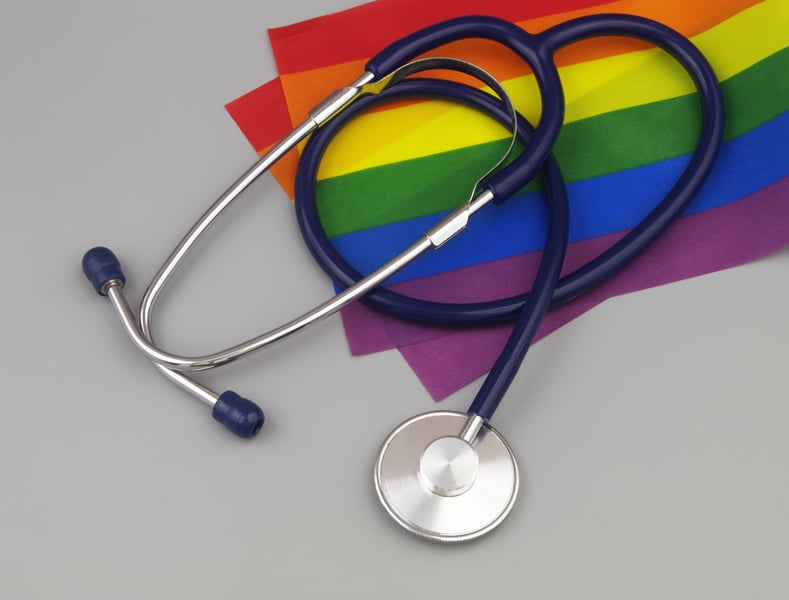Get Healthy!

- Sarah D. Collins
- Posted September 26, 2023
Stigma, Even Harm Common When Transgender People Meet With Doctors
Transgender people have a tough time receiving adequate medical care due to issues like voyeurism, being treated as abnormal and even being denied care due to their gender identity, a new study finds.
"I would say what I read was not surprising at all, based on things I have heard from trans members,"said Tari Hanneman, director of the Health and Aging Program at the Human Rights Campaign Foundation. She reviewed the findings, but was not involved with the study.
"I've heard stories of patients basically being treated as a medical oddity," Hanneman said. "I've even heard horror stories of some residents or medical students taking photographs and things like that, that are just completely inappropriate."
The study aimed to understand the experiences of transgender people when their identities are known to family medicine clinicians, and to look into the reasons transgender individuals might share, modify or withhold information from their providers.
A diverse community advisory board held seven focus groups with 30 transgender adults living in North America, which included transgender clinicians. Key ideas were coded and analyzed, with four main themes emerging from the focus group discussions.
The first was that transgender people often perceive doctors' questions as "voyeuristic, stigmatizing or self-protective,"which made patients feel angry, confused and needing to protect themselves. Experiences included things like being repeatedly misgendered and being asked about hormone treatments, even when they had nothing to do with the reason they were seeing the doctor that day.
"Doctors"¦ ask a lot of invasive questions,"shared one study participant. "I saw a pulmonologist earlier in the year and one of his first questions was, 'When are you getting genital surgery?' and I was like, 'I'm here for my lungs.'"
Other themes included patients being pathologized, denied or given substandard care, or even harmed by doctors, including having a nonconsensual exam performed in one case and inadequate pain medication given after a ruptured appendix in another.
"After clinicians learn that patients are trans, usually transgender people feel that their care gets worse and not better,"said study author Dr. Ash Alpert (pronouns: they/them), a professor of hematology at the Yale School of Medicine. "A number of people in the study talked about how people started misgendering them after they learned that they were transgender instead of getting their pronouns right."
These medical experiences left the study participants stuck between choosing to reveal their gender identity and face transphobia or withholding their gender identity and consequently receiving ineffective medical care. They also discussed the fact that improving the safety of transgender people in the medical system is complicated due to the medical field being "inherently violent or stigmatizing of transgender people."
"Some of the folks in the study really talked and thought deeply about what change [in the medical field would] look like,"said Alpert. "Some people talked about folks needing more trainings, or we need to change the electronic health record. But a lot of other participants, including, and maybe particularly, clinicians, had concerns that those changes would not be enough. And that actually what's required is change on a systems level, maybe an institutional level."
Alex Sheldon (pronouns: they/them) is executive director GLMA: Health Professionals Advancing LGBTQ+ Equality.
"These narratives really give voice and add nuance to this well-documented phenomenon of medical misattribution called trans broken arm syndrome,"they said. "And that syndrome refers to this tendency of health care providers to attribute any medical issue or discomfort experienced by a trans and non-binary person directly to their gender identity and therefore then they potentially overlook genuine health concerns. So, those narratives in particular I think serve as a stark reminder of the need for health professionals to treat every patient as a whole person, rather than reducing them to their gender identity."
Medicine isn't the only institution of which transgender people have to be wary.
So far in 2023, a record-breaking 568 bills have been introduced in 49 U.S. states and at the federal level that seek to block transgender people from receiving "basic health care, education, legal recognition and the right to publicly exist,"according to Trans Legislation Tracker. These include banning gender-affirming care through the age of 26, banning books that "promote gender fluidity or gender pronouns,"drag show bans and pushing to make someone's sex assigned at birth as an "immutable" definition of man or woman.
The study was published Sept. 25 in Annals of Family Medicine.
More information
For more transgender identity, visit The Trevor Project.
SOURCES: Alex Sheldon, MA, executive director, GLMA: Health Professionals Advancing LGBTQ+ Equality; Tari Hanneman, MPA, director, Health and Aging Program, Human Rights Campaign Foundation; Ash Alpert, MD, MFA, instructor of medicine, Section of Hematology, Yale Cancer Center, Yale School of Medicine, New Haven, Conn.; Annals of Family Medicine, Sept. 25, 2023







